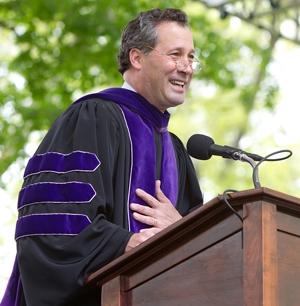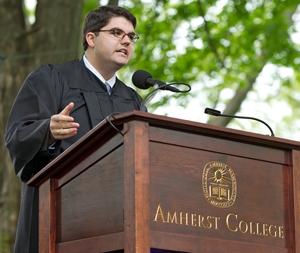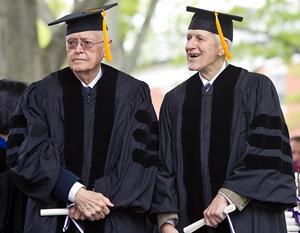May 23, 2011
AMHERST, Mass. — In his annual address at Amherst College’s 190th Commencement Exercises this morning, President Anthony W. Marx reminded the school’s graduates of the investment of “hope and effort” that their alma mater has made in them, and charged the new alumni to apply their intellectual skills to moral problems and pursue their passions in ways that contribute to the greater good. It was a poignant eighth and final commencement speech for Marx, who spoke of the “explicit commitment to an elite based not on inheritance but on merit, guided to use knowledge to improve the world on the smallest to the biggest scales,” as he will be leaving academia in July to head the New York Public Library.
Marx’s address, and the exercises themselves, capped a weekend of activities celebrating the graduating seniors. The events also included the awarding of seven honorary doctorates and four honorary bachelor of arts degrees to distinguished guests and 482 bachelor’s degrees to the students. There were also lectures, concerts and other festivities. (Audio of talks given by the honorees and photos from the weekend can be found on the college’s Commencement website.)
 “You are my class,” President Anthony W. Marx told the members of the Class of 2011 |
Marx opened his speech with an acknowledgment that it would be his last graduation at Amherst; he will end his eight-year term at the school on June 30. “I join in your ranks, for today we graduate together,” he told the Class of 2011. “You are my class.”
He went on to examine the college’s official mission statement, paying particular attention to its exhortation of graduates to lead “lives of consequence”—a phrase that has sparked debate within the Amherst alumni community in recent years. “What ‘consequence’ should your life have?” asked Marx. “Some have thought the college presumes to judge the lives of its alumni, or that we refer here only to public achievement … or that we ignore disappointments … or risks that fail. … No such narrowing is intended. … Creating families, enlivening friendships and communities, are consequential.”
“But you do now join a privileged few,” he reminded the graduates, and “with privilege comes responsibility.” Making reference to the ideas of President John F. Kennedy (who spoke at Amherst in 1963, a month before his assassination), poet Robert Frost (who taught at Amherst for many years), playwright Lee Blessing and writer Jack London, Marx told the Class of 2011 that the present and future world urgently need them to “consider what excites [them] most, especially if it seems daunting, and light after it”; this way, they would “always bring more to life, and get more from it.”
Drawing from political theorist Hannah Arendt’s idea of “thinking as moral action” and giving examples of individuals around the globe facing modern moral dilemmas, Marx argued that such dilemmas are better solved when people are “possessed of that mindful and moral baggage which a liberal arts education provides.”
“I believe the quality of our society is only as good as the breadth of its citizens’ minds. Here at Amherst we know that the more thoughtful we all are, the better our world will be,” Marx continued. “We must prevent divides of opportunity or of access to ideas from widening further; rather, we must further liberate the flow of talent, ideas and debate that undergird a civil and progressing society. That is what Amherst stands for, what a great library stands for, and it is what America stands for.”
Playing on the college’s Latin motto, Terras Irradient (“Let them give light to the world”) and an idea from Henry David Thoreau, Marx closed with an anecdote about an Amherst math professor, now retired, who chose an office overlooking the quad, “so that students could see that his light was on and know that he was there for them.” He promised the graduates, “The college’s light will always be on for you. We rejoice that, at every step of your journey, you also will continue to light up our world, and all will see and be inspired.”
 Senior Gregory Campeau ’11 addressed his classmates |
Prior to Marx’s remarks, the graduates heard from Gregory J. Campeau ’11, who was chosen by his classmates to speak at the ceremonies. Campeau spoke about how the college community played a role in educating the graduates. “We live and dine and learn together in a community, not as individuals. In this way, we affirm here at Amherst what any founder of an ancient university most certainly knew: It’s just not right to commit oneself to learning in a completely cloistered environment. There was never a university of one. The very word ‘university’ assumes the many over the few, the diverse over the provincial; and similarly the liberal arts make an argument about what in that universe is most essential to know first in that communal journey toward knowledge.” What’s more, he said, “the enterprise of true, fruitful education seems to necessarily involve others supporting us as well as challenging us. Without this component, it all falls flat. How could any of us have changed our minds—really changed our minds—had we not lived amongst one another and eaten meals together?” He ended by charging his classmates to “go out from this place as ones humbled by what they know and even more so by what they do not know. Go out as ones who have loved and have been loved by a rich community. Go out as ones who have been sharpened with purpose, for meaningful use. Go out as ones who will take the time not only to exercise the intellect well but also to love well those new neighbors you are soon to meet and to ask the hard questions about what this life is about, where it's headed, what does or does not come next.”
 World War II veterans Frank R.L. Egloff ’46 and J. Bruce Duncan ’45 receive their long-overdue diplomas |
Following the speeches of Marx and Campeau, the college awarded bachelor of arts degrees to the graduates and honorary degrees to 11 special guests. Honorary doctorates went to John Abele ’59, retired founding chairman of the Boston Scientific Corporation and founder of The Argosy Foundation; Adam Falk, high-energy physicist, former professor and dean at The Johns Hopkins University and current president of Williams College; Andrew Kendall ’83, executive director and president of The Trustees of Reservations, a large nonprofit organization that protects properties of scenic, historical and ecological value across Massachusetts; Gail Kern Paster, a Shakespearean scholar and a former professor at The George Washington University, soon to retire from her position as director of the Folger Shakespeare Library; economist Paul Volcker, chairman of the Federal Reserve under Presidents Jimmy Carter and Ronald Reagan and of the Economic Recovery Advisory Board under President Barack Obama; Alice Waters, founder, chef and owner of the famed restaurant Chez Panisse and a longtime activist in the movements for local, organic and sustainable food; and Kimmie Weeks ’05, an activist for young people affected by poverty and war, particularly in West Africa. Honorary bachelor’s degrees went to four former Amherst College students who left the school more than 65 years ago to serve the nation during World War II, but who nonetheless went on to earn graduate degrees and lead distinguished careers: business owner Richard Hunter ’44, M.B.A.; attorney J. Bruce Duncan ’45, J.D.; psychiatrist Frank R.L. Egloff ’46, M.D.; and internist C. Burns Roehrig ’45, M.D.
Also recognized during the ceremony was ’66 alumnus Arthur W. Koenig, who received the Medal for Eminent Service for exceptional and distinguished service to the college for a great period of time; he established the college’s Koenig Scholarship Fund, which supports the recruitment and education of five high-achieving students each year from low-income families in Africa and Latin America. Teachers Clark Ginapp, formerly of Holyoke High School in Holyoke, Colo.; Robert Hepner of Melvindale High School in Melvindale, Mich.; and Linda D. Linville, retired from Centennial High School in Corona, Calif., were honored with Phebe and Zephaniah Swift Moore Awards after being nominated by graduating seniors whom they had taught in high school. Husband and wife Paul T. Schnell ’76 and Joanne W. Schnell served as honorary marshals for the ceremonies.
The Obed Finch Slingerland Memorial Prize, given by the trustees of the college to members of the senior class who have shown by their own determination and accomplishment the greatest appreciation of and desire for a college education, was awarded to Sadie Marella Casamenti ’11 of Hackensack, N.J., and Andrea Kyla Nicole Wise ’11 of Seattle.
The Woods-Travis Prize, an annual gift in memory of Josiah B. Woods and Charles B. Travis of the Class of 1864, was awarded for outstanding excellence in culture and faithfulness to duty as a scholar. It went this year to Emma Catherine Fink ’11 of Ontario, N.Y.
For more photos, audio and text of speeches, go to the Amherst website the week of May 23.
###